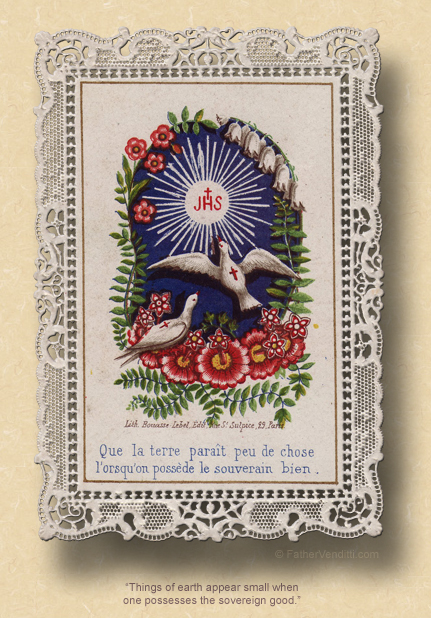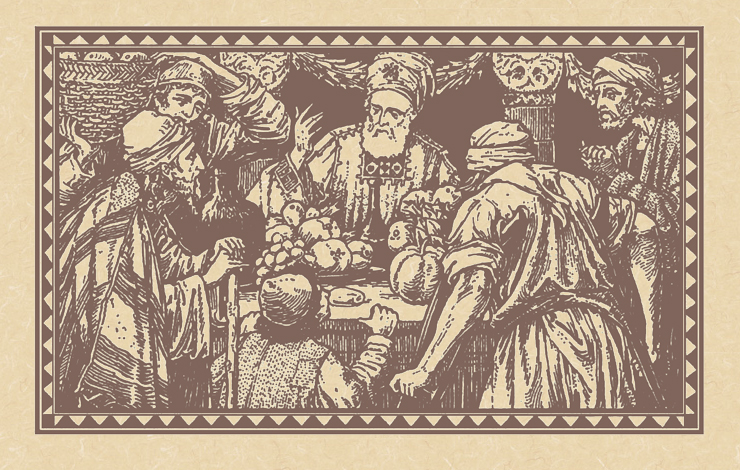Which Jesus Do You Believe in?
The Eighteenth Sunday of Ordinary Time.
Lessons from the tertiary dominica, according to the ordinary form of the Roman Rite:
• Ecclesiastes 1: 2; 2: 21-23.
• Psalm 90: 3-6, 12-13.
• Colossians 3: 1-5, 9-11.
• Luke 12: 13-21.
The Eleventh Sunday after Pentecost.
Lessons from the dominica, according to the extraordinary form of the Roman Rite:
• I Corinthians 15: 1-10.
• Psalm 27: 7, 1.
• Mark 7: 31-37.
The Eleventh Sunday after Pentecost; the Prefestive Day of the Procession of the Venerable & Life-Creating Cross; and, the Feast of the Holy & Righteous Eudocimus.*
First & third lessons from the pentecostarion, second & fourth from the menaion for the venerable Righteous, according to the Ruthenian recension of the Byzantine Rite:
• I Corinthians 9: 2-12.
• Galatians 5: 22—6: 2.
• Matthew 18: 23-35.
• Matthew 11: 27-30.
FatherVenditti.com
|
 8:00 AM 7/31/2016 — The Parable of the Foolish Rich Man is always a favorite among preachers who like to blast their congregations with “hell, fire and brimstone” because it is a hell, fire and brimstone Gospel passage. It reminds us that, sooner or later, we're going to be judged according to our deeds and, if we're smart, we'll assume it's sooner and not later; for, as our Lord says, not even the angels know the day (cf. Matt. 24: 36). It’s one of those inconvenient passages where a lot comes out in the wash, because it strips away the greeting card version of Christianity that many people have today. 8:00 AM 7/31/2016 — The Parable of the Foolish Rich Man is always a favorite among preachers who like to blast their congregations with “hell, fire and brimstone” because it is a hell, fire and brimstone Gospel passage. It reminds us that, sooner or later, we're going to be judged according to our deeds and, if we're smart, we'll assume it's sooner and not later; for, as our Lord says, not even the angels know the day (cf. Matt. 24: 36). It’s one of those inconvenient passages where a lot comes out in the wash, because it strips away the greeting card version of Christianity that many people have today.
For purely nominal Christians, particularly those who don’t practice their faith regularly, Christianity means little more than love and warmth and unconditional forgiveness, often expressed in the phrase, “Well, that doesn’t sound very Christian,” as if they have any clue what the Gospel says. In fact, I had a conversation with someone some time ago, who told me quite plainly that the reason he often skips from one church to another is because he is searching for a church that leaves him feeling uplifted and fulfilled. In other words, for him, the practice of his faith is simply to provide him with emotional support: little more than therapy, just without the price-tag. And so fond are some people of this therapeutic interpretation of Christianity that it never occurs to them to consider what our Lord has to say. In other Gospel passages Jesus talks about judgment day by saying: “I tell you, on that night, where two men are sleeping in one bed, one will be taken and the other left; one woman taken, one left, as they grind together at the mill, one man taken, one left, as they work together in the fields” (Luke 17: 34-35 Knox). In other words, some of us may not make it; our salvation is not guaranteed, but is dependent on what we actually do in this life. And there are some so-called Christians who simply can't deal with that. For whatever reason they refuse to believe it, and say things like, "I don't believe that anyone goes to Hell," which, if true, means that our Lord is a liar.
Pope Saint John Paul II said so many times, “There is no such thing as love separated from truth.” It's just like a kid who's flunking algebra class, and goes to his teacher on the day the marking period ends, and says, "But don't you want me to pass?" Of course the teacher wants him to pass; that has nothing to do with it. The truth is he hasn't earned a passing grade. And that was his choice, not the teacher's. The exact same thing is true with people who, by their rejection of the Gospel, have separated themselves from the love of God: God does not send them to hell; they find their way there all by themselves. The account of creation in Genesis couldn't be clearer; in fact, it's the whole point of the book: man chooses his own path.  The Creator does not force him to go this way or that. God shows us a destination in the Scriptures; through the Tradition and the teaching of the Church He gives us a GPS to tell us which roads to take; He even provides service stations along with way in the form of the sacraments, just in case we should take a wrong turn and get sidetracked; but, He does not take hold of the wheel or put His own foot on the gas. We're driving the car, not Him. Just like our Lord, Himself, said in the parable about Lazarus and the Rich Man (cf. Luke 16: 19-31): as the rich man is burning in the fires of Hell, he calls to Abraham to send Lazarus as a messenger to his brothers, so they don't make the same mistakes, and what does Abraham say? “They have [read] Moses and the prophets; let them listen to these” (Luke 16: 29 Knox). The Creator does not force him to go this way or that. God shows us a destination in the Scriptures; through the Tradition and the teaching of the Church He gives us a GPS to tell us which roads to take; He even provides service stations along with way in the form of the sacraments, just in case we should take a wrong turn and get sidetracked; but, He does not take hold of the wheel or put His own foot on the gas. We're driving the car, not Him. Just like our Lord, Himself, said in the parable about Lazarus and the Rich Man (cf. Luke 16: 19-31): as the rich man is burning in the fires of Hell, he calls to Abraham to send Lazarus as a messenger to his brothers, so they don't make the same mistakes, and what does Abraham say? “They have [read] Moses and the prophets; let them listen to these” (Luke 16: 29 Knox).
There comes a point in the life of every Christian where he has to decide which Jesus he's going to follow: the Jesus of the Gospel, or the “jesus” he may have invented in his own mind. We can protest our Lord's stern warnings in the Gospel all we want and say, "I don't picture God that way"; but, ultimately, it's not important how we picture God, but how God pictures us. We can make up our own version of God in our own minds, but that's not going to change Who God is. I can say, "The Christ I believe in would never allow anyone to go to Hell," but is the Christ I believe in real? That's an important question. And if I did said say something like that because that kind of milquetoast Jesus is easier to wrap my emotions around, would I not be doing exactly what Saint Paul is railing against in today’s second lesson, when he warns the Colossians: "Stop lying to one another, since you have taken off the old self with its practices and have put on the new self, which is being renewed, for knowledge, in the image of its creator" (Col. 3: 9-10 NABRE)? For knowledge! Not for emotions. Not for good feelings. Not for unity or for getting along. For knowledge, meaning: for the Truth!
Now, does this mean our judgment is to be pure recompense and retribution? Certainly not, because God is merciful. That's why He gave us so many helps which offer to us so many graces, the best example here being the Sacrament of Confession. The irony here is that the people who like to protest our Lord’s teaching about death and judgment are usually the same ones who haven't been to confession in years. Here is something that our Lord Jesus gave us, which He didn't have to give us, by which we can make ourselves right with God when we've sinned. And when someone decides he doesn’t have to go to confession, the only thing you can conclude is that he doesn’t want to be saved.
Clearly, it's our Lord's desire that we be prepared for our judgment. He wouldn't have said the things He did if He didn't want us to avoid Hell and attain Heaven, and He wouldn't have given us the tools that we need to do so if He wasn't interested in all of us being saved. But it's up to us to listen to what He says, and to use the tools He has provided.

* Eudocimus, a noble and holy Cappadocian, died in the year 840.
Tomorrow's feast, the Procession of the Honorable and Life-Creating Cross, marks the beginning of the Dormition Fast. Traditionally, this penitential period is observed in the exactly the same way as the Great Fast (Lent), with the exception that the Eucharist may be celebrated on weekdays (though this is not required). Consequently, lessons are provided for the weekdays of this period for those parishes that continue to offer daily Divine Liturgy. While the tradition is to observe this period with a Strict Abstinence from both meat and dairy products (with the usual mitigations for wine and oil on Saturdays, Sundays and the Feast of the Transfiguration), in the Ruthenian Metropolia of the United States the observance of this fast is voluntary.
|

